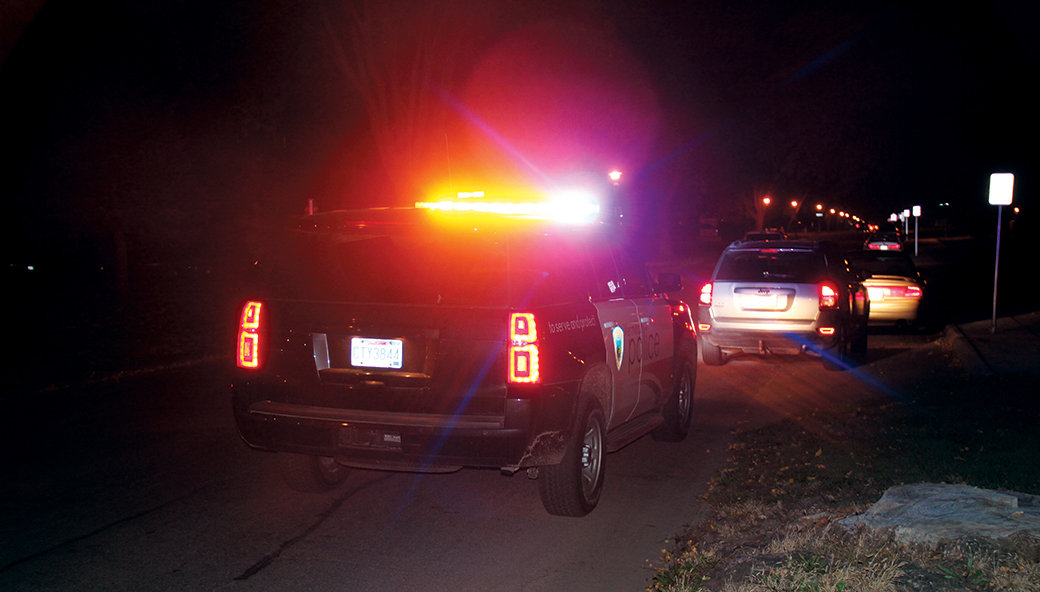
Professor: Knowing legal rights important in encounters with the police
With a summer of tension between police and the communities they patrol, some students may wonder, just what are their rights in a police encounter?
Sydney Andre, a freshman studying English, said that she gets nervous when she is pulled over.
“I got really nervous because just having to deal with the police causes anxiety,” Andre said. “They are kind of intimidating when they come up to your car.”
Students are encouraged to understand their rights on campus and how to avoid further trouble with police, said Sandy McKeown, the director of USD’s Criminal Justice Program. If things at a protest, party or on the way home didn’t go so well and a person finds themselves detained by the police, they have the right to ask why. Staying silent, however, is usually the best option, she said.
“Retain an attorney when you have the opportunity. Everything that you say, everything that you do is most likely being recorded, and it will most likely be used against you if you ultimately end up going to trial,” McKeown said. “Shutting your mouth is the first thing I would say to somebody who’s been stopped by the police.”
If a student is walking around or riding a bike, an officer can stop them at their discretion. However, if an officer stops someone for a long period of time, starts asking them questions or even starts to pat an individual down, the officer needs to state why they think that person might be breaking the law, McKeown said.
Unreasonably stopping and searching an individual is a violation of the fourth amendment.
Meredith Jenkins, a junior majoring in music education, said she feels that honesty is the best policy when dealing with the police.
“I got pulled over for drunk driving the first day I had my permit,” Jenkins said. “I was driving my dad’s new truck and I was really nervous so I liked to turn the wheel and go over the white line a lot… I wasn’t actually drunk though.”
At the time, Jenkins found the situation distressing.
“I was crying,” Jenkins said. The police officer, however, was friendly and understanding, as she was a young driver at the time.
Kevin Phillips, junior in music education/vocal performance, had an experience similar to Jenkins’.
“I got pulled over for drunk driving because I swerved around a cone that was tipped over in a construction zone, but I wasn’t drunk,” Phillips said. “I never felt like my rights were violated. In one situation I had a cop pulled me over, he was kind of rude, but I just shrugged it off.”
In relation to protests, McKeown said that if a person is involved in a protest, they are exercising their rights under the First Amendment. If an officer attempts to arrest a protestor because they personally disagree with the protest, that is a clear violation of the First Amendment.
However, if during a protest someone starts vandalizing property or breaking windows, the police can make arrests. McKeown said creating loud noises or engaging aggressive behavior in a protest can be considered disturbing the peace or disorderly conduct.
This doesn’t only apply to protests — if someone refuses the police after being asked to turn down loud music, that would be considered disorderly conduct, which is a class two misdemeanor.
As for partying, even a 21-year-old is at risk of being detained if they don’t have an ID on them and the police are suspicious, McKeown said. After leaving the party, a student helping a friend home might not be in the clear, either — if an officer suspects that one of them is underage, they can stop the pair.
Even people who don’t protest, party or play loud music can find themselves in the grip of the law if they’re careless when driving or parking their car.
If a student gets a parking ticket they feel is unfair, they can go to the university website to initiate the appeal process. Similarly, if someone gets a traffic citation they feel is unfair, they simply have to go to court on the date on the ticket instead of paying the fine. This leads to a bench trial, in which the individual argues their case and the officer argues theirs and then a judge decides, McKeown said.
In some circumstances, even the snug retreat of one’s own dorm room may not be insulated from police encounters, said second-year law student Casson Dennison.
If an officer is going past a dorm for any reason and sees anything illegal, such as alcohol, in plain sight, the “plain view rule” comes in to play and the officer can enter the room. However, the police cannot search a room if there is nothing illegal plainly visible in the room, unless they obtain a warrant.
“Ninety-nine percent of the time he’s going to say, ‘I’m coming into this room because I see something illegal,'”Dennison said. “Usually he will ask to come in the room and it is best for you to comply because something illegal is going on.”

